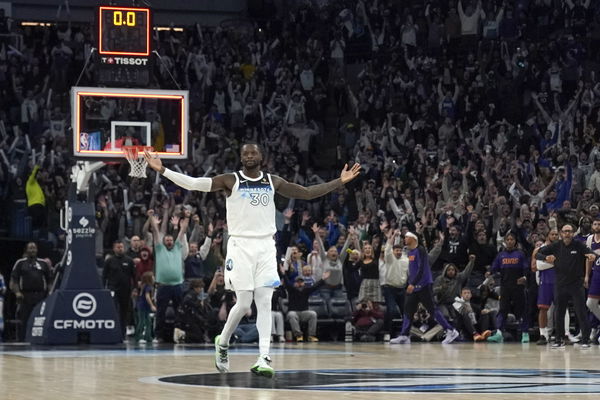
via Imago
Nov 17, 2024; Minneapolis, Minnesota, USA; Minnesota Timberwolves forward Julius Randle (30) celebrates his game-winning three-pointer against the Phoenix Suns at the end of the fourth quarter at Target Center. Mandatory Credit: Nick Wosika-Imagn Images

via Imago
Nov 17, 2024; Minneapolis, Minnesota, USA; Minnesota Timberwolves forward Julius Randle (30) celebrates his game-winning three-pointer against the Phoenix Suns at the end of the fourth quarter at Target Center. Mandatory Credit: Nick Wosika-Imagn Images
Ah, the NBA Last Two Minutes reports—where the league officially breaks down the final moments of close games, often leaving fans with more questions than answers. It has unsurprisingly a mix of validation and frustration for teams and fanbases alike, as it dissects critical calls (or non-calls) that can sway the outcome. The latest report involving Julius Randle and the Suns is no exception, sparking yet another round of debate over officiating in crunch time. According to the report, Randle’s push-off on Josh Okogie during a pivotal moment was deemed a correct no-call.
But here’s the kicker: the report also acknowledges a missed travel on Randle during the final possession—a play that could’ve changed everything. This only adds salt to the wound for the Suns’ faithful, as the missed travel potentially cost them a fair shot at a win. It’s safe to say the debate over how the game ended isn’t dying down anytime soon.
PHNX Sports’ Gerald Bourguet tweeted the update on X: “Fun stuff on the NBA’s Last 2 Minutes report. Says Julius Randle’s push-off on Josh Okogie was a correct no-call, but also that there was a missed travel on the final play by Randle. So the Suns still got screwed on the last possession.”
ADVERTISEMENT
Article continues below this ad
Fun stuff on the NBA’s Last 2 Minutes report. Says Julius Randle’s push-off on Josh Okogie was a correct no-call, but also that there was a missed travel on the final play by Randle.
So the Suns still got screwed on the last possession pic.twitter.com/rvBd5Jm9zq
— Gerald Bourguet (@GeraldBourguet) November 18, 2024
Bourguet’s tweet sums up the frustration completely, pointing out that while the push-off was deemed a correct no-call, the missed travel adds fuel to the fire. It’s a call that could have drastically altered the outcome, leaving Suns fans feeling like the deck was stacked against them. There are various calls regarding the referees rewinding the play before the foul to find other offenses. It has received widespread criticism.
As such, it naturally leads us to wonder just how costly these late-game mistakes are.
What’s your perspective on:
Did the NBA's missed travel call on Randle rob the Suns of a rightful victory?
Have an interesting take?
Exploring the cost of late-game officiating errors on NBA credibility
The debate over officiating in the league, particularly during late-game moments, often centers on the impact of missed or questionable calls on the outcome of matchups. The Julius Randle drama, in itself, is a prime example of how these crucial calls fuel frustrations among fans and players alike.
However, this is not just limited to the categories mentioned above. It, in fact, ties into broader concerns about the integrity of the game, with critics arguing that inconsistent or missed calls undermine the league’s credibility. While it’s understood that referees can make mistakes, particularly in fast-paced scenarios, the NBA’s transparency through tools like the Last Two Minutes Report provides insight. However, it often leaves fans feeling the league isn’t doing enough to address officiating flaws.
ADVERTISEMENT
Article continues below this ad
For those not in the know, the league keeps complete statistics on incorrect calls and non-calls in the last two minutes of an NBA game when the score is within three points since 2015. And according to a 2019 Sports Journal paper by Kevin Sigler (Professor of Finance, Cameron School of Business, UNC Wilmington), in 4,297 minutes of action reviewed from 26,822 plays from 1,476 games (March 2015 to June 6, 2018), “the officials have missed or incorrectly called 2,197 plays, or about 8.2 percent of all calls reviewed. This amounts to 1.49 wrong decisions in the final minutes of each close game.”
Of course, this is a little too old to work with here. But it does give you an idea of what actually goes down despite measures taken to ensure transparency. Hence, it’s little wonder that calls for reform and improvements such as enhanced officiating transparency and the use of advanced technology are growing.
In fact, under Bourguet’s tweet, a user commented on quite an interesting and practical solution. “I wish the NBA had a system similar to MLB’s electronic umpire setup. Imagine more cameras capturing multiple angles in real-time, with additional referees stationed at a review table to monitor nearly every play. This system could be used instantly whenever a foul is called or when there’s doubt about whether a foul should have been called.”
ADVERTISEMENT
Article continues below this ad
In a mid-November issue of Northeastern Global News, it notes that baseball’s Atlantic League (an independent circuit with teams on the East Coast and Texas), became “the first professional baseball league to let a robot umpire call balls and strikes.” With Commissioner Adam Silver’s interest in AI and technology, this wouldn’t be such a bad idea.
Circling back to Julius Randle, though, the missed travel on the forward highlights how a single call can alter a game’s fate. The frustration surrounding this decision is far from over, and the debate will probably continue to fuel discussions across the NBA.
ADVERTISEMENT
ADVERTISEMENT
ADVERTISEMENT
ADVERTISEMENT


Did the NBA's missed travel call on Randle rob the Suns of a rightful victory?